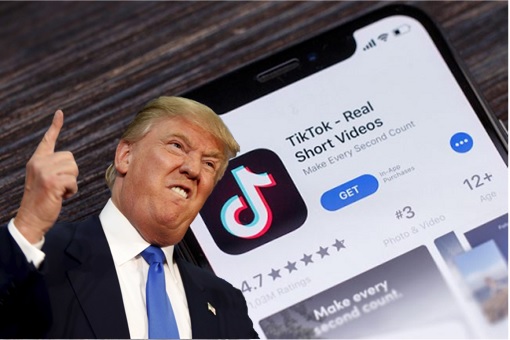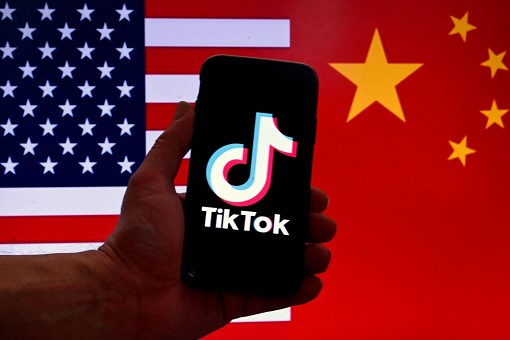
Trump’s Executive Order To TikTok To Surrender 50% Stake – But Condemned As Daylight Robbery In China
January 21st, 2025 by financetwitter
Hours after his inauguration on Monday (January 20) as the 47th President of the United States, Trump signed close to 100 executive orders. He orders the U.S. to quit the World Health Organization (WHO) as his most trusted lieutenant, Tesla and SpaceX boss Elon Musk, gave a one-armed gesture during a speech celebrating the crowning of Donald Trump, which have likened to a Nazi salute.
The new Commander-in-Chief gladly reverses 78 of Joe Biden’s executive orders and revokes the ex-president’s policies, including withdrawing from the Paris Climate Accords, not to mention ending government censorship of speech. Trump’s other orders on the first day of his second term included ending birthright citizenship, declaring a national emergency at the U.S.-Mexico border and ending asylum by speeding deportations.
Trump also signed orders to cut regulations around energy production and reduce inflation, effectively eliminating former President Joe Biden’s climate regulations linked to electric-vehicle (EV) production. While he didn’t implement new tariffs on his first day, he has warned in the Oval Office that he plans to slap 25% tariffs on imports from Canada and Mexico on February 1.

As Sleepy Joe issued pre-emptive pardons for his own family in the eleventh hour, Trump similarly gave sweeping pardons to nearly 1,600 rioters charged (whom he called “patriots”) with storming the Capitol on January 6, 2021. President Trump also announced that his administration was in the process of removing “over a thousand” Biden appointees who had not already resigned.
More importantly, the 78-year-old Trump – the oldest president in US history on inauguration day – instructed the attorney general not to enforce a U.S. ban on social-media app TikTok for 75 days. Essentially, the short-form videos went dark in the U.S. for less than 24 hours before given a lifeline and its service was restored by the POTUS, whose mission was to ban TikTok during his first term in office.
The 75-day extension was a tactical move to force ByteDance, owner of TikTok, to sell 50% of its stake to an American owner under the pretext of a 50-50 partnership between “the United States” and its Chinese owner. As expected, Trump warns that he may impose new trade tariffs on China if a deal for the platform is not struck. He said if Beijing rejected the deal, it would be considered a “hostile act”.

TikTok chief executive Shou Zi Chew attended Trump’s inauguration on Monday along with other bosses of big giants like Elon Musk, Mark Zuckerberg and Jeff Bezos. Other U.S. companies, billionaires and celebrities have expressed interest in buying TikTok, including X (formerly Twitter) owner Musk and an investor from the TV show Shark Tank, Kevin O’Leary.
However, while majority of America’s 170 million TikTok users cheered and celebrated Trump’s executive order, Chinese netizens were outraged with the U.S.’ latest blackmail. Tens of millions of users on the social media platform Weibo flocked to hashtags related to the proposed 50-50 ownership, with many condemning the US government’s “daylight robbery.”
Trump, a businessman whose policies as the U.S. president would be driven by profit and revenue, hopes that a 50:50 joint venture involving a U.S. firm would provide the middle ground to both U.S. lawmakers and Beijing to accept the deal. But millions of Chinese on social media have mocked and ridiculed the U.S., asking Apple, Tesla and Nvidia to also surrender 50% of their control.

The fact that Donald Trump has refrained from slapping tariffs on Chinese goods (which Trump had threatened earlier during campaign), and has even thrown a lifeline for TikTok besides having a phone call with Chinese president Xi Jinping speaks volumes that Trump is willing to negotiate with Beijing, despite campaigning on a hardline stance on the country.
This means TikTok has never been a national security threat to the U.S. from the beginning. In 2020, then-President Trump tried, and failed to ban the app – as well as WeChat – over concerns the company was sharing Americans’ personal information with the Chinese government. Subsequently, he wanted to bulldoze a new ownership between TikTok and American companies.
The bid for TikTok had seen how Microsoft and Walmart teamed up to acquire the Chinese company’s business in the U.S., Canada, Australia and New Zealand. Its parent company, ByteDance, had also attracted interest from Oracle. Twitter, Netflix and even Triller, a rival app, has reportedly joined the race to buy TikTok. A deal, if went through, will be worth between US$20 billion to US$30 billion.

But Donald Trump behaved more like a greedy businessman than a respectable president when he shamelessly demanded a cut – “key money” – of the TikTok-Microsoft deal. It had never happened before in the history of American corporate deals. Charlotte Jee, a reporter at MIT Technology Review, said Trump’s request for money from the deal showed Mafia-like behaviour.
However, as a sign of protest and its reluctance to sell, TikTok had filed a lawsuit against the U.S. government over President Trump’s executive order back then, arguing that the ban prevents the company from due process, as guaranteed by the Fifth Amendment, which says that no one shall be “deprived of life, liberty or property without due process of law.”
Chinese media, of course, had slammed the executive order issued by the POTUS as “theft” and labelled the U.S. as nothing but a “rogue country”. They argued that like Huawei, the decision to ban TikTok was taken because the app is a threat to American technology firms. The Trump administration was mocked for “stealing Chinese technology”.

In a dramatic move to level the playing field with the U.S., Beijing had cleverly made some modifications to its export rules. Specially designed to affect the potential sale of TikTok to Microsoft- Walmart, Oracle or any other U.S. companies, the new rules say that a license or approval from Beijing is needed before companies can export their technologies.
Now that Trump is back in the White House in 2025, he is trying his luck again to force China to sell TikTok, probably to Elon Musk, who is a “good friend” of Beijing and at the same time – Trump’s most trusted adviser. For Musk, acquiring TikTok and preserving Americans’ access to the app would give him control over an even larger and more influential social media platform than X (formerly Twitter).
But even if Elon Musk is given “full access” to TikTok’s source code to ensure no back doors exist, it’s also true that Chinese officials have indicated Beijing is willing to approve a deal as long as ByteDance doesn’t have to give up the artificial intelligence algorithms behind the hugely successful Chinese app. The burning question is whether Musk is willing to buy TikTok without the secret sauce?

Forcing ByteDance to sell TikTok to Americans is like forcing Alphabet to sell Google to the Chinese. If it’s impossible for Google’s algorithm to fall into the hands of China, it’s also a wishful thinking that TikTok’s “secret sauce” can fall into the possession of the U.S. Yes, the engine or the algorithm is the reason why Microsoft, Oracle, WalMart, Twitter, Netflix and even Triller, a rival app, wanted to buy TikTok previously.
But according to the South China Morning Post (SCMP) – “The car can be sold, but not the engine.” Even if ByteDance wants to sell TikTok’s algorithm, it can’t because an approval from Beijing is needed before Chinese companies can export their technologies. On the other hand, even if China agrees to allow ByteDance to sell TikTok, it can only be sold without the algorithm.
After failure to acquire 100% of TikTok, the U.S. is attempting to get at least 50% stake (and hopefully the secret sauce). Even former treasury secretary Steven Mnuchin, who served under Trump, revealed that it was all about business when he was putting together a group of investors to buy TikTok. He said – “I understand the technology, it’s a great business, and I’m going to put together a group to buy TikTok”.

Judging by those who attended Trump’s inauguration on Monday, it’s impossible to ignore the looming specter of oligarchy, and even kleptocracy and kakitocracy taking root in American politics. It’s not just a government of the rich, but an administration where the ultra-wealthy and influential are in control. Trump’s cabinet appointments alone tell how the so-called swamp is being turned into a private country club for the rich.
A dozen members of the cabinet are billionaires, with 26 others worth more than US$100 million. Donald Trump and his wife Melania launched their own crypto currency on the even of inauguration. Together, they control a staggering amount of wealth, and try to not only rewrite the tax code to benefit only the wealthy, but also to use tariffs to force TikTok to sell to American billionaires.
This could be a new game. While Trump is trying to weaponize tariffs to help his cronies to get even richer in the acquisition of TikTok, at the same time, Beijing could be using TikTok as a chess piece to pressure the U.S. to make concessions, such as to allow more access for Chinese tech giants, including Huawei or even the U.S. market for Chinese electric vehicles.

Rarely, very Rarely , Donald Fuck does a right maneuver.
ReplyDeleteEarly days!
Delete搬起石头砸自己的脚!
Wait for the backfiring.